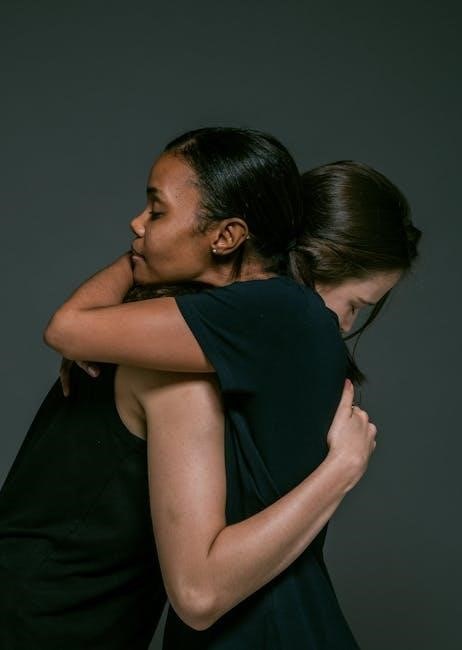This guide serves as a bridge for understanding, fostering empathy and connection between Black men and women. It explores cultural contexts, emotional landscapes, and shared experiences to promote mutual growth and comprehension, emphasizing the importance of open dialogue and respect in building stronger relationships.
Understanding the Importance of Mutual Comprehension
Mutual comprehension is essential for bridging gaps between Black men and women, fostering empathy and connection. It involves acknowledging the unique challenges each face, such as societal pressures and stereotypes, while actively listening to their experiences. By understanding these dynamics, individuals can break down barriers and build trust. Open dialogue and shared perspectives create a foundation for stronger relationships, allowing both parties to grow and support one another. This comprehension is not just about communication but also about recognizing the emotional and mental health struggles that often go unspoken. When both partners prioritize understanding, they can navigate challenges together, fostering a deeper sense of unity and mutual empowerment. This guide aims to illuminate these pathways, encouraging meaningful connections and collective progress.
Setting the Foundation for Empathy and Connection
Empathy and connection are vital for fostering meaningful relationships between Black men and women. By actively listening to each other’s experiences and perspectives, individuals can build a strong emotional bond. Open dialogue, free from judgment, allows both parties to express their feelings and concerns. Mutual respect is the cornerstone of this connection, ensuring that both voices are heard and valued. Understanding the historical and cultural contexts that shape interactions can deepen empathy. Trust is cultivated when both individuals feel safe to share their truths. This foundation of empathy and connection creates a space for growth, healing, and mutual understanding. It encourages vulnerability and patience, enabling both partners to navigate challenges together and strengthen their relationship. Ultimately, this foundation is essential for building a resilient and supportive partnership.
Cultural Context and Historical Background
Understanding the historical journey of Black men and women provides insight into societal expectations and their lasting impact on relationships, fostering mutual comprehension and respect.
The Historical Journey of Black Men and Women
The historical journey of Black men and women is marked by resilience, strength, and a shared struggle against systemic oppression. From the transatlantic slave trade to the Civil Rights Movement, their experiences have shaped their collective identity. Understanding this history is crucial for fostering empathy and connection. The legacy of Jim Crow laws, segregation, and racial discrimination has left deep scars, yet it also highlights their ability to thrive despite adversity. By examining this journey, we can appreciate the cultural richness and contributions of Black individuals, while acknowledging the challenges they continue to face. This historical context provides a foundation for building bridges of understanding and mutual respect in relationships, emphasizing the importance of shared experiences and collective growth;
Societal Expectations and Their Impact
Societal expectations have long influenced the dynamics between Black men and women, creating unique challenges. Black men are often expected to embody strength and financial stability, while Black women are frequently stereotyped as resilient caregivers. These roles, rooted in historical and cultural norms, can lead to emotional and mental strain. The pressure to conform to these expectations often results in feelings of exhaustion and misunderstanding. For instance, the “strong Black woman” stereotype can prevent women from expressing vulnerability, while men may feel burdened by the need to provide. These societal demands can strain relationships, as individuals struggle to balance external pressures with their own needs. Understanding these dynamics is crucial for fostering empathy and breaking free from limiting stereotypes. By addressing these expectations, both partners can work toward a more balanced and supportive relationship. This starts with open communication and mutual recognition of the challenges each faces. Ultimately, challenging these societal norms is essential for building healthier, more equitable connections.
Understanding the Black Man’s Perspective
Black men face unique emotional and mental health challenges, often shaped by societal pressures and expectations. Understanding their struggles with vulnerability and communication is key to fostering deeper connections and empathy.
Emotional and Mental Health Challenges
Black men often face emotional and mental health challenges, compounded by societal expectations and stereotypes. Many struggle with expressing vulnerability due to cultural norms that emphasize strength and resilience. Historical trauma, systemic discrimination, and daily microaggressions contribute to stress and anxiety. Additionally, the pressure to be providers can lead to feelings of inadequacy and isolation. Mental health stigma within communities further discourages seeking help. Understanding these struggles is crucial for fostering empathy and support. Recognizing the impact of these challenges on relationships and overall well-being can pave the way for healthier communication and mutual understanding.
Communication Styles and Expressions
Black men often exhibit communication styles shaped by cultural, social, and personal experiences. Many prioritize directness and assertiveness, reflecting a desire to convey clarity and strength. Non-verbal cues, such as body language and tone, play a significant role in their expression. Storytelling and humor are frequently used to connect and share experiences. However, societal expectations can sometimes limit emotional expression, leading to misconceptions about their openness. Understanding these communication patterns helps bridge gaps in relationships. By recognizing the nuances in their expressions, Black women can foster deeper connections and mutual understanding. Effective communication is key to building trust and empathy, allowing both partners to navigate challenges together more effectively. This understanding promotes a healthier exchange of ideas and emotions, enriching the relationship dynamic;
The Influence of Stereotypes and Media Portrayals
Stereotypes and media portrayals significantly shape perceptions of Black men, often reducing their complexity to oversimplified or negative images. Media frequently depicts Black men as aggressive, hypermasculine, or perpetually struggling, reinforcing harmful narratives. These portrayals can influence how Black women view Black men, creating misunderstandings and unrealistic expectations. Societal stereotypes, such as the “strong Black woman” trope, further complicate relationships by imposing unattainable standards. Media also often erases the diversity of Black men’s experiences, failing to showcase their vulnerability, emotional depth, and individuality. Recognizing these biases is crucial for fostering genuine connections. By moving beyond stereotypes, Black women can gain a more nuanced understanding of Black men’s multifaceted identities and shared humanity. This awareness helps dismantle barriers and promotes empathy in building stronger, more authentic relationships.

Building a Connection
Building a connection requires mutual respect, trust, and empathy. Open communication fosters understanding, while shared experiences strengthen emotional bonds. This foundation allows for deeper relationships and meaningful collaboration.
Cultivating Empathy and Understanding
Cultivating empathy and understanding involves actively listening to each other’s experiences and perspectives. For Black women and men, this means acknowledging the unique societal challenges each faces while fostering mutual respect and compassion. Empathy bridges gaps by allowing individuals to see beyond surface-level differences, creating a space for open dialogue. Understanding the historical and cultural contexts that shape Black men’s lives helps Black women appreciate their resilience and struggles. Similarly, recognizing the strength and sacrifices of Black women fosters admiration and support. This mutual effort to comprehend one another’s journeys strengthens bonds and paves the way for healthier, more meaningful relationships. By prioritizing empathy, both parties can navigate challenges together, fostering a deeper connection rooted in shared experiences and mutual respect.
Sharing Experiences and Stories
Sharing experiences and stories is a powerful way to foster connection and understanding between Black men and women. By openly discussing their journeys, challenges, and triumphs, both parties can gain insight into each other’s worlds. Black women often carry the weight of societal expectations, such as the “Superwoman Schema,” which demands strength and resilience. Sharing these experiences highlights the emotional toll and the need for support. Similarly, Black men’s stories reveal their struggles with stereotypes, mental health, and societal pressures. Active listening and empathy are crucial in these exchanges, allowing both individuals to feel heard and validated. Through shared narratives, mutual understanding deepens, creating a foundation for stronger, more compassionate relationships. This exchange of truths fosters a space where both can grow together, embracing their shared humanity and unique perspectives.
Navigating Relationships
Navigating relationships between Black men and women requires open communication, mutual respect, and understanding of each other’s emotional and societal challenges to foster collective growth and stronger bonds.
Dating and Relationship Challenges
Dating and relationship challenges between Black men and women often stem from societal pressures, stereotypes, and misunderstandings. Historical and cultural factors can influence expectations and communication styles, leading to friction. Financial stress and differing priorities may also strain relationships. Additionally, external biases and media portrayals can create unrealistic standards, affecting trust and intimacy. Open dialogue and mutual empathy are essential to navigate these challenges. Understanding each other’s perspectives fosters deeper connections and strengthens relationships. By addressing these issues collectively, couples can build a foundation of trust, respect, and shared growth, ultimately overcoming obstacles and fostering a more fulfilling partnership.
Support Systems and Community Roles
Strong support systems and community roles are vital for fostering understanding and connection between Black men and women. Shared experiences within the community create a foundation of mutual empathy and trust. Family, friends, and cultural organizations often play key roles in nurturing relationships by providing emotional support and practical guidance. Community activities and social events also serve as platforms for open dialogue, helping to break down barriers and build stronger bonds. By engaging in collective efforts, individuals can gain a deeper understanding of each other’s challenges and aspirations, fostering a sense of unity and cooperation. These support networks not only strengthen personal relationships but also contribute to the empowerment and resilience of the community as a whole.
Maintaining Independence and Interdependence
Maintaining independence while fostering interdependence is crucial for healthy relationships between Black men and women. Both partners should prioritize personal growth and individual goals, ensuring neither loses their sense of self. At the same time, building a connection based on mutual respect and understanding strengthens the bond. Open communication and shared values help create a balance where each person feels valued and supported. Independence fosters resilience, while interdependence nurtures emotional and mental well-being. By respecting each other’s boundaries and ambitions, Black men and women can thrive individually and collectively, ensuring a harmonious and empowering relationship that honors both personal and shared aspirations.

Addressing Challenges Together
Black men and women must unite to tackle societal issues, discrimination, and financial literacy. Through collective action, they can foster unity, progress, and empowerment, ensuring a brighter future together.
Tackling Societal Issues and Discrimination

Addressing systemic racism and discrimination requires collective effort and understanding. Black men and women face unique challenges rooted in historical oppression, which manifest in modern society through microaggressions, biases, and unequal opportunities. Open dialogue about these issues fosters empathy and unity, enabling both genders to support each other in combating injustice. Financial literacy and economic empowerment are critical tools for overcoming systemic barriers, as they provide stability and independence. By advocating for equity and challenging stereotypes, Black men and women can dismantle societal constructs that perpetuate division. Collaboration within the community strengthens resilience and promotes progress, ensuring that both genders can thrive together. Mutual support and shared goals are essential for creating a future where equality and justice prevail.
Financial Literacy and Economic Empowerment
Financial literacy is a cornerstone of economic empowerment, enabling individuals to manage resources effectively and build sustainable futures. For Black men and women, understanding budgeting, saving, and investing is crucial for overcoming systemic barriers. Access to financial education and tools helps bridge gaps created by historical inequities. Banking institutions and community programs play vital roles in providing resources tailored to these needs. Encouraging entrepreneurship and collaboration can foster economic growth within the community. By addressing financial challenges together, Black men and women can achieve shared goals, such as homeownership or business ventures. Empowerment lies in equipping oneself with knowledge and support systems to navigate financial landscapes confidently, ensuring a legacy of prosperity for future generations. Collective efforts in financial literacy pave the way for a more secure and independent future.

Empowerment and Growth
Empowerment and growth foster collective progress, enabling Black men and women to thrive individually and together. Mutual support and understanding cultivate resilience, helping overcome challenges and achieve shared goals.
Mutual Empowerment and Support
Mutual empowerment and support are vital for fostering healthy relationships between Black men and women. By acknowledging each other’s strengths and challenges, individuals can create a foundation of trust and collaboration. Open communication and active listening play key roles in this process, allowing both parties to express their needs and aspirations. Empowerment involves uplifting one another, celebrating successes, and providing comfort during difficult times. This mutual support system not only strengthens individual resilience but also enhances the overall well-being of the community. When both partners feel valued and supported, they are better equipped to navigate life’s challenges together, fostering a sense of unity and shared purpose.
Engaging in Community and Social Activities
Engaging in community and social activities strengthens bonds between Black men and women, fostering a sense of belonging and collective purpose. Participating in cultural events, workshops, and volunteer opportunities provides platforms for shared learning and growth. These activities encourage open dialogue, helping to break down barriers and build understanding. Community involvement also allows individuals to connect on a deeper level, fostering empathy and mutual respect. By actively contributing to their communities, Black men and women can collaborate on initiatives that promote social change and empowerment. Such shared experiences not only enrich personal relationships but also contribute to the overall well-being of the community, creating a supportive environment for everyone to thrive.

This guide concludes by reflecting on the journey of mutual understanding and respect between Black men and women. It emphasizes the importance of continued growth and unity, looking forward to a future filled with empathy, collaboration, and shared prosperity.
Reflecting on the Journey and Progress
Reflecting on the journey of understanding and connection between Black men and women reveals significant progress in bridging gaps and fostering empathy. By examining historical contexts, societal expectations, and personal experiences, we gain insight into the challenges faced and the resilience demonstrated. Mutual comprehension has been key to navigating stereotypes, communication barriers, and emotional struggles, paving the way for deeper connections.
This journey underscores the importance of shared growth and unity. Through open dialogue and a willingness to learn, both partners can overcome misunderstandings and build a foundation of trust and respect. The path forward lies in continued empathy, collaboration, and a commitment to understanding one another’s perspectives, ensuring a brighter, more harmonious future for all.
Looking Ahead to a Brighter Future
Looking ahead, the future holds immense promise for Black men and women as they continue to foster understanding and unity. By embracing mutual respect, open communication, and shared goals, they can overcome societal challenges and build stronger relationships. Education, empathy, and community support are vital in dismantling stereotypes and promoting empowerment.
Financial literacy and economic growth also play a crucial role in creating a stable foundation for future generations. Through collective efforts, Black men and women can create a society where both thrive, celebrating their unique strengths while supporting each other’s aspirations. The path to a brighter future lies in unity, resilience, and a shared vision of equality and prosperity.